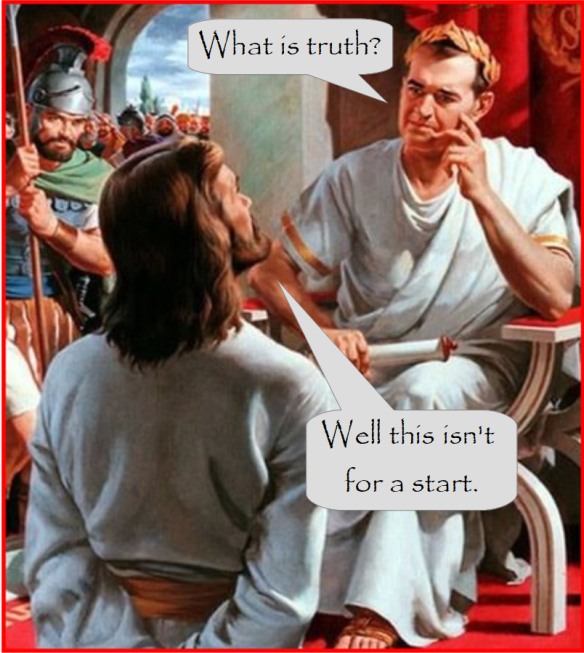
This a response to Don Camp’s comment on my post The Evil of Christianity, in which he tries to isolate ‘the crux’ of our disagreement about the Faith.
You start, Don, from the assumption that there is a God. I, on the other hand, have considered the evidence and concluded that in all probability there isn’t one. Certainly not the Christian God. There may be a god out there somewhere that has no interest in human beings and their affairs, though I doubt it. As far as we humans are concerned such a deity is as good as non-existent, being entirely hypothetical. If it is out there, it certainly won’t be offended at my saying so.
Once I realised some years ago that a personal God did not exist a number of other things followed (or rather, collapsed):
No God means no Son of God or God Incarnate, no Saviour or Christ.
No God means no resurrection (which Paul makes clear was a work of God).
No God means no Holy Spirit.
No Holy Spirit means no regeneration of individuals to become new creations in God (you only have to look at Christians today to see this is the case.)
No God means no grand Salvation plan.
No God means no Heaven, no Final Judgement, no Kingdom of Heaven of Earth, no Eternal Life.
No God means the universe can’t have been created by him.
No God means no manipulation of evolution, no intervention in human history and no prophecy of things to come.
No God means that the world would be just as we find it: messy, beautiful, dangerous, turbulent, indifferent.
No God means prophecy is man-made and comes to pass at no greater rate than chance allows (i.e. practically zero.)
No God means conversations with ‘him’, revelations from him and visions of him are all imagined, generated by and within the human brain, which works in mysterious ways.
No God means no God-given morality. Morality is, as you say, culturally determined and so may and does change over time. (You can see this in the Bible itself where morality supposedly handed down by God for all time evolves throughout the Old Testament and into the new.)
No God means there is neither Sin nor Righteousness. These are religious concepts. The whole spectrum of human behaviour, from destructive to altruistic, is demonstrated by believers and non-believers alike.
No God means assertions like ‘the issue turns on what I perceive as good for me versus what God declares is good for me’ are illusory. What is good for you is what you have worked out, even if you think God had a hand in it. A supernatural being who doesn’t exist cannot be responsible for your well-being, though your church and the bible undoubtedly contributed to your conditioning.
No God means individuals must work out their own meaning and purpose. Some do, some don’t, as you observe, Don. This is as true of believers as it is for non-believers. Many atheists have managed it, or not, without having it imposed by religion. And despite what you say, Christianity is a religion. It is the epitome of religion.
No God means none of the Abrahamic religions are true and therefore Christianity and its ‘holy’ book, being based on an invalid premise, must be false. Most of the posts on this here blog are about demonstrating this fact.
No God means all gods are man-made, not all gods except one.
The crux of the matter is you believe in God while I see how unlikely it is that there is one. I’d agree with you if I could, Don, but then we’d both be wrong.










